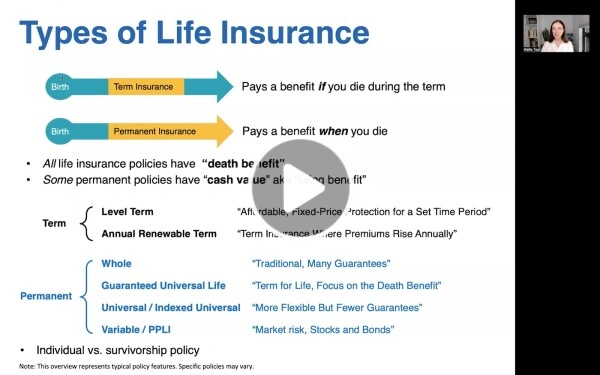Many people buying life insurance care about protecting the little ones in their lives.
But a minor (someone under the age of 18) cannot own assets, so how do you designate beneficiaries?
Never Do This
Do not write in your minor child as a beneficiary, either primary or contingent. This is a common mistake.
A minor cannot own assets directly. A trust or authorized adult needs to be involved.
What You Should Do...If You Don't Yet Have a Will / Estate Plan
[Full name of grownup you'd trust to manage money in the child's best interest] as custodian for [full name of child], under UTMA
Example:
Anna Batista Chawla as custodian for Delia Elizabeth Frost, under UTMA.
Once you have a will or estate plan in place (which we definitely recommend!), then you can revise your life insurance beneficiary designations, if necessary.
What You Should Do...If You Have a Will / Estate Plan
First, great work getting that done! Second, it's best to ask the attorney you worked with how to designate beneficiaries so that the insurance proceeds go where you would want them to go.
There's (way) more than one way to do an estate plan, so making sure your estate plan and life insurance "play nicely together" is important.
A Word of Caution for People with (Many) Millions of Dollars
There's one thing you should be aware of: if you buy life insurance as an individual and later want to transfer it to a trust (a common technique for removing the assets from your estate), you'll need to stay alive for at least 3 years - after the transfer to the trust - in order to have those life insurance proceeds not count as part of your estate.
If, instead, you set up a trust first and have the trust buy the life insurance, then the life insurance proceeds would be outside your estate from Day 1 (assuming you work with a competent attorney who structures the trust properly, which we recommend).
This consideration is relevant to you only if:
-
Your net worth is - or you expect it to be - over the Federal basic exclusion amount (currently $13.99mm / person of $27.98mm / married couple in 2025...this number gets adjusted for inflation each year, and is scheduled, under current law, to get cut in half on January 1, 2026,
or -
You live in a state with an estate or inheritance tax and your net worth is high enough to incur meaningful taxes
AND -
You've decided that you'd like to spend the time and money today to set up your estate to optimize estate tax minimization
If this applies to you, be sure to avoid this mistake: do not put off getting life insurance just to avoid the "3 year rule" noted above, if you currently have insufficient life insurance to replace your income (or free care).
Ask yourself: if you were killed in a car crash next month, would the amount of insurance you have right now be enough for you to feel good about your surviving loved ones' finances?
If the answer is "no", then do not delay -- the people depending on you would be much better off if they got your life insurance net of estate taxes, rather than getting nothing (or an insufficient existing policy).
If this is your situation, let your AboveBoard contacts know, and we can help you figure out the right approach. We are happy to collaborate with your estate planning attorney or financial advisor, too.
To get started with life insurance, get a life insurance quote.



